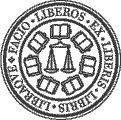Liberals against liberalism
Submitted by Heather on November 07 2000 02:53:42
In reply to Well, yes, I do know what you mean... submitted by Dirk Gently on November 06 2000 23:05:07
|
"And the anathema declared by St. John Chrysostom against all those who kill heretics still stands." Cool! Do you have that at hand? Maybe we should post it at the top of the index, to reassure nonChristian visitors. :) "This conflicts with the notion of 'freedom of religion,' which is one of the major tenets of the modern secular religion known as liberalism." I get you now. Wish I could meet my Anglo-Catholic friend; the trials of liberalism are one of his favorite topics. :) Speaking of which, I came across a fascinating condemnation recently of religious liberalism – by a Unitarian Universalist minister. He's talking primarily about the horrible lack of intellectual integrity that tends to occur in his own denomination, but I think that what he says is applicable to many other denominations as well. On scientism: "This kind of reasoning exalts Science (and usually capitalizes it), and criticizes most 'spirituality' as a fuzzy mélange of feelings lacking necessary definitions. . . . This scientistic style of thinking is today a reaction against religious language, but cannot, because of its limited scope, hope to be an adequate heir to religious thinking. It seeks to clarify thinking, but operates within a severely restricted theory of knowledge that cannot, by definition and design, address the personal and subjective hungers that, for the majority of us, constitute the religious search. So, while the intent is good, scientism adds to the chaos in our congregations. On politics as a religion: "'Unitarian Universalism' is primarily a political identity that accepts a wide variety of individual religious beliefs, precisely because the religious beliefs are peripheral and the politics are central to the identity and goals of the UUA. As long as members are pro-choice (for just one example) they can be Christian, Jewish, atheist, Wiccan or Other, because their religious beliefs are irrelevant as long as their social and political identity is in order. But if they are very vocal about being pro-life, they will not be likely to feel very welcome—again, regardless of their religious beliefs. This is the description of a political ideology, not a religion." On "theological double talk": "By this, I mean 'God-talk' used as a nostalgic, ornamental addition to ordinary language. This is the most popular style of using God-talk today. We frame our ultimate concerns, our fears and yearnings and our understanding of the human condition in ordinary language—or in the vocabularies of 'scientific' disciplines (psychology, anthropology, sociology, etc.) rather than in religious jargon. Then we add a few 'religious' words or phrases—a prayer, benediction, or gratuitous references to 'God,' as ecclesiastical flourishes or ritual signs of our intent to keep that older language somehow involved." As an example: "The Bargain is: We'll relinquish all supernaturalism, all the miracles, all notions of this man Jesus as an other-worldly savior figure. In return we'll keep using all the terms we've just debunked, and still call ourselves Christians. But it will be a Christianity without a Christ, a resurrection without an afterlife and a God without an existence—except in the determined imaginations of believers. . . . "The same two-step occurs in synagogues, mosques, or the Mormon Tabernacle, of course—or in Wiccan groups in our own churches, when anthropomorphic attributes are projected onto The Goddess. But the stubborn fact remains: concepts don't have attributes, and playing this game compromises our integrity and our religion. It is another example of keeping what we know and what we believe separated, the move I don't believe can be allowed within the tradition of liberal religion." He concludes: "These three paths are about feeling good or right rather than being good or right. Any trustworthy notion of being good—notions of the Good Life, the noble person, or the wise path—must be measured against standards that transcend the ideology of our own group. Otherwise, they are impossible to distinguish from narcissism and its sister, solipsism."
|
Follow ups:
